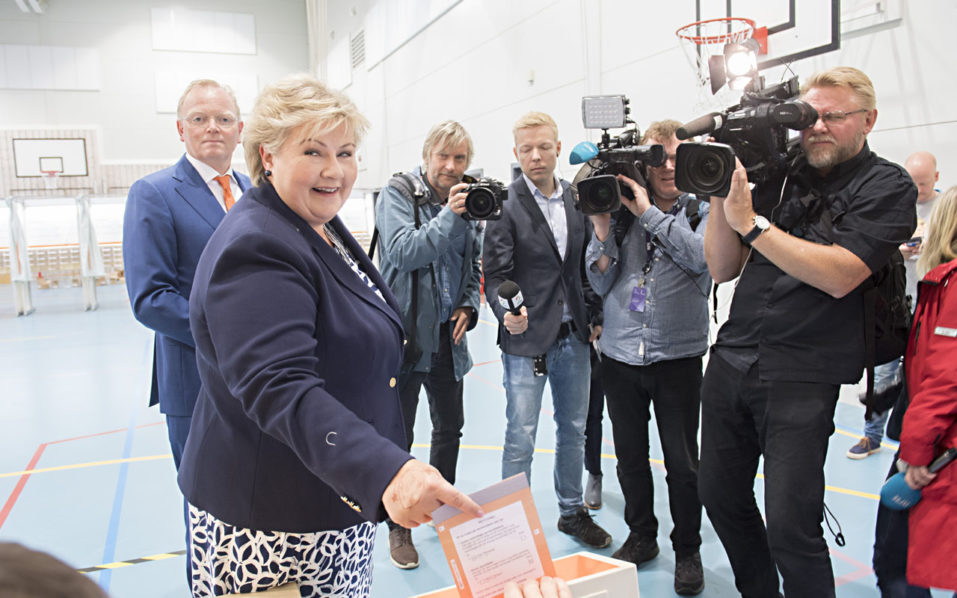Norway’s Prime Minister Claims Victory In Close Election


Conservative Prime Minister Erna Solberg claimed a narrow victory in Norway’s legislative elections on Monday, saying voters in the oil-rich country had given her “a mandate for four more years”.
“We have to be a little cautious, but it looks as though we will have a non-socialist majority,” she told a rally of supporters chanting “Erna! Erna!” as confetti and streamers were dropped on the crowd.
Her Conservative Party, along with its anti-immigration junior coalition partner the Progress Party and two other centre-right allies, were on track to win a slender majority of 89 of the 169 seats in parliament, with 95 percent of votes counted.
The opposition, headed by Labour leader Jonas Gahr Store, was seen taking 80 seats.
Store, a 57-year-old millionaire who has previously served as the country’s foreign minister, conceded defeat and wished his rival well.
“This is a big disappointment for Labour,” he told supporters after results showed his party would lose six seats yet remain the largest in the country.
“Our goal was to give Norway a new government. We knew it was going to be close, and it was close. But as it looks now it wasn’t enough to replace a Conservative-Progress Party government with a Labour government,” he said.
Solberg’s Conservatives meanwhile lost seven seats.
The election outcome hinged in great part on whether Solberg’s small centre-right allies, the Liberals and Christian Democrats, would manage to break a key threshold in the vote.
Taking more than four percent of ballots translates into extra seats in parliament. Both parties long hovered around that mark, but were seen surpassing it.
The results confirmed opinion polls which had predicted an extraordinarily close race in “the world’s happiest country”.
Solberg’s re-election marks the first time in more than 30 years a Conservative prime minister has won a second straight term.
Tough talks ahead
In power since 2013, Solberg had campaigned on a pledge of continuity.
Her government has successfully steered the wealthy country of 5.3 million — Western Europe’s biggest oil producer — through two crises: the oil industry’s slump after the drop in crude prices since 2014 and the migrant crisis in 2015.
Over the past four years, the right has focused on kick starting the economy and laying the groundwork for the post-oil era by reducing taxes.
But the opposition and many economists have criticised the government for dipping too generously into the country’s huge sovereign wealth fund, worth almost $1 trillion (800 million euros).
Meanwhile, Store had vowed to raise taxes for the richest in a bid to bolster Norwegians’ cherished welfare state and reduce inequalities in society.
“We need a change now because we are growing apart from each other,” the 57-year-old Labour leader said after casting his ballot on Sunday, an option offered in many municipalities.
Norway is blessed with high living standards, education and a comprehensive welfare state — qualities that helped it to be named the happiest country in the world in a respected UN study in March.
The Conservatives and Labour agree on many issues: continued oil activities in the Arctic, a restricted immigration policy, and close ties with the EU, of which Norway is not a member.
Yet Labour has criticised Solberg for her difficulty in taming her occasionally provocative junior coalition partner, the Progress Party, especially Immigration and Integration Minister Sylvi Listhaug.
The new government will meanwhile have its work cut out for it: while the two small centre-right allies agreed to return Solberg to power, they have expressed growing dissatisfaction with the mildly populist Progress Party on issues such as the climate and immigration.
“We can’t provide any guarantee for the next four years,” the head of the Christian Democrats, Knut Arild Hareide, told a party leader debate held after Solberg claimed victory.
Solberg said she had invited the four rightwing parties to “talks about how to pursue this cooperation”.
“I’m sure that we will find good solutions for the four parties during the next four years,” she said.
Meanwhile, the independent Greens Party, which opinion polls had suggested could possibly become a kingmaker, scored under the four percent threshold, no doubt eliciting a sigh of relief from the oil industry.
The party had called for a halt to all new oil exploration and the end of oil production within 15 years.
Source: The Guardian








